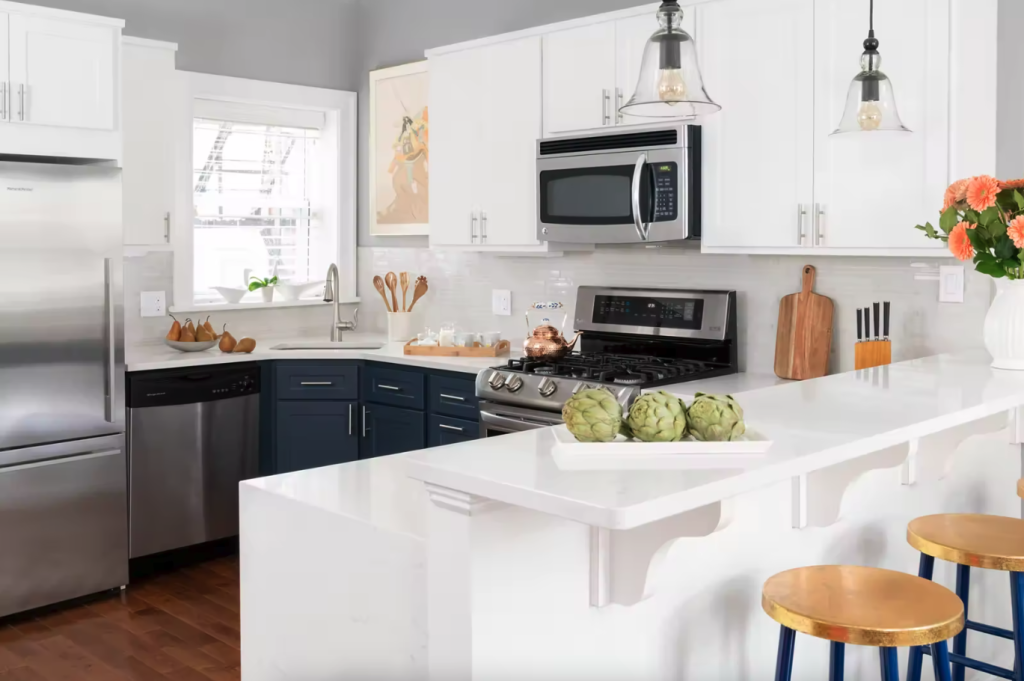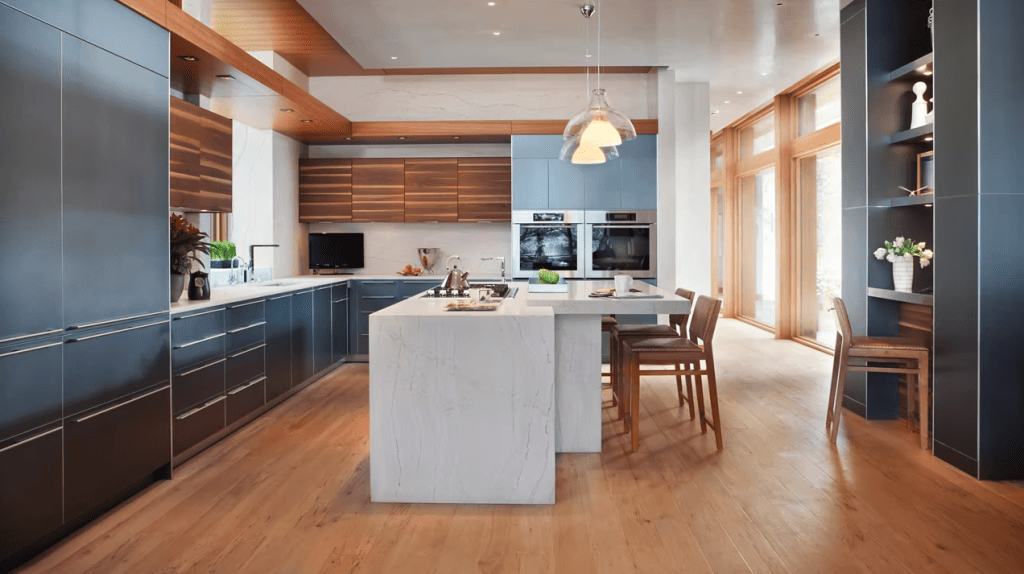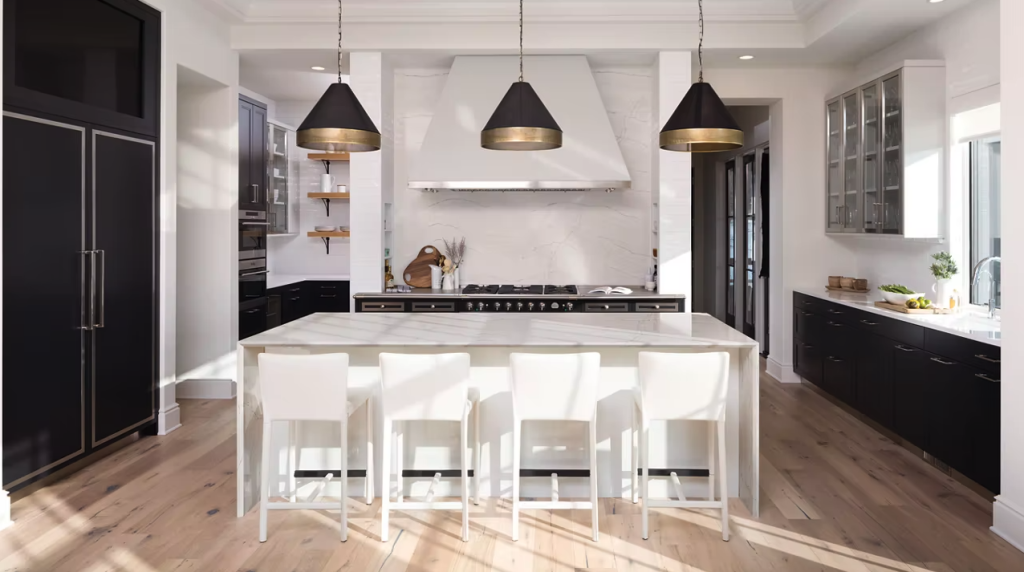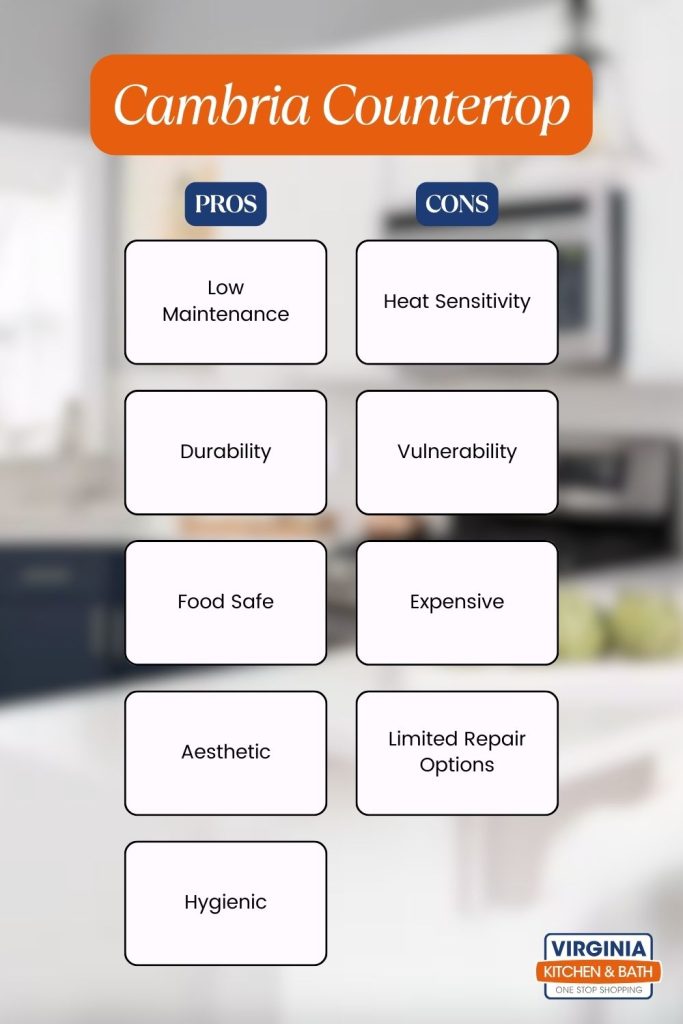If you already know that you want a stone countertop, then you know you have a wide selection of choices in front of you. From granite to marble to quartz, it can be difficult to keep track of the differences between all of your different options. If you have been interested in a kitchen remodel for a while, you have probably heard the name, Cambria. Cambria makes quartz countertops and surfaces that are sold and installed through independent dealers. They are an American company that continues to remain family-owned. There are a few other things that set Cambria’s surfaces apart from other manufacturers. Here are all of the things you need to know about Cambria countertops.

Image from Cambria
Quartz vs. Granite
Cambria makes their countertops out of quartz. Though many people believe they are the same, quartz is different from granite because it is an engineered stone. The color and pattern of quartz are also manufactured. Most quartz countertops, including Cambria’s, are primarily made of quartz but also include resin and some pigment. Unlike quartz, granite comes out of the earth in slabs. Most of the high-quality granite retains its original color and tone when it is sold to the customer. As a material, quartz is quite strong and flexible, which makes it easy for contractors to work with and install.
Style and Color
Most quality granite does not undergo any coloring after it is mined. This means that once it is polished, the color is in the same condition that it was found in. The natural color is popular because it creates an earthy vibe. Because it is natural, however, it will not be a uniform color, and there can be discrepancies in the color of granite slabs. This is what distinguishes it from quartz. Quartz will often come with a small amount of resin and pigments added to it. This means that quartz comes in a wide variety of colors that have been carefully controlled. These colors are just as beautiful as granite; however, they have the added benefit of providing a uniform style that is not always available on a slab of granite.

Granite retains its natural, earthy color after mining, leading to unique but non-uniform slabs, while quartz is enhanced with resins and pigments, offering a wide range of controlled, uniform colors. | Image from Cambria
Maintenance
Maintaining Cambria countertops is straightforward and hassle-free. They don’t require sealing, making them less prone to damage and stains. While they are durable and can withstand daily use, it’s important to avoid exposing them to extreme heat; always use a pad for hot pans. When cleaning, simply use warm water and mild soap. It’s crucial to avoid harsh chemicals, abrasive cleaners, and rough pads, as they can damage the surface. This easy care routine makes Cambria a practical choice for both beauty and functionality in any kitchen.
Food Safe Surfaces
Cambria countertops are highly suitable for both commercial and residential kitchens due to their NSF certification for food and splash zones. Their non-porous nature prevents bacteria from penetrating the surface, making them exceptionally hygienic for food preparation. This characteristic ensures a safer and cleaner environment for handling food, contributing to their appeal as a practical and health-conscious choice for kitchen surfaces.

Cambria countertops are low-maintenance, requiring only warm water and mild soap for cleaning and no sealing, making them resistant to damage and stains. They are also NSF-certified for food and splash zones, offering a hygienic, non-porous surface ideal for food preparation in both commercial and residential kitchens. | Image from Cambria
Purchasing Cambria
Instead of offering their products to big home improvement stores, Cambria focuses on their personal relationships with independent dealers and installers. So, for homeowners interested in this kitchen countertop option, it is necessary to work with a contractor.
Pros and Cons

| Pros of Cambria Countertops | Cons of Cambria Countertops |
|---|---|
| 1. Low Maintenance: Requires only warm water and mild soap, no sealing needed. | 1. Heat Sensitivity: Requires protection from extreme heat. |
| 2. Durability: Resistant to damage and stains, suitable for daily use. | 2. Potential Damage: Vulnerable to harsh chemicals and abrasive cleaners. |
| 3. Food Safety: NSF-certified, non-porous surface prevents bacteria. | 3. Cost: May be more expensive than other countertop materials. |
| 4. Aesthetics: Offers a wide range of controlled, uniform colors. | 4. Limited Repair Options: Difficult to repair if damaged. |
| 5. Hygienic: Ideal for both commercial and residential kitchens. |
Going Green
Cambria’s quartz countertops present an eco-friendly alternative to traditional stone. Unlike other stone mining processes, which can be environmentally damaging, Cambria’s quartz production is more sustainable. A significant portion of their quartz is sourced responsibly, and they incorporate recycled materials to minimize their carbon footprint. Manufacturing in the U.S., Cambria supports local economies and reduces fossil fuel dependence in shipping. Their commitment to sustainability is further evidenced by their complete recycling of water used in manufacturing processes. Additionally, Cambria‘s countertops are Greenguard certified, ensuring they don’t negatively impact indoor air quality. As a responsible choice for eco-conscious consumers, Cambria sets itself apart in the quartz countertop market with its environmentally friendly practices and high-quality products.


